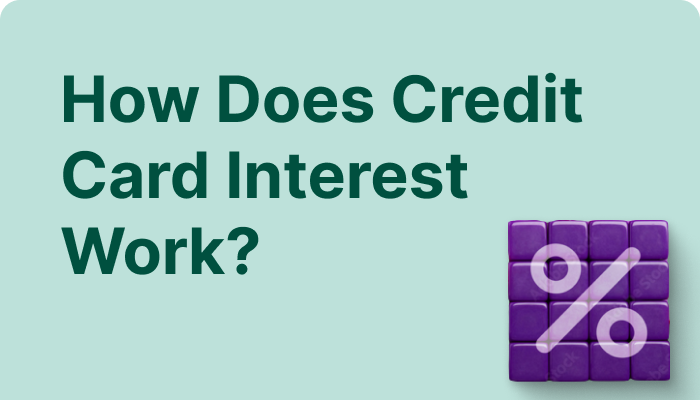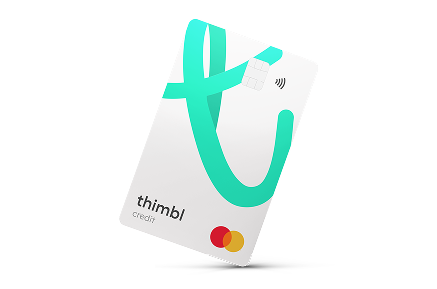How Does Credit Card Interest Work?
Joe Lytwyn | 30/08/24

If you’re thinking about applying for a credit card, you might have a few questions about interest, such as:
- What is credit card interest?
- How does credit card interest work?
- How does credit card interest accrue? and,
- Can you avoid paying it?
We’ve put together a guide with the answers to some of the most frequently asked questions regarding credit card interest. Whether you’re a first-time credit card user or you’re simply looking to refresh your knowledge, this blog is for you.
What is credit card interest?
Credit card interest is the cost of borrowing money from your credit card provider, and is displayed as a percentage rate.
Interest rates vary between different credit card products and providers. The lower the rate, the less interest you’ll pay; similarly, the higher your credit score, the more likely you are to be eligible for a credit card with a better rate of interest.
Some credit cards are specifically designed to help those with low or no credit build and improve their credit position. It’s worth noting that these credit cards are likely to be advertised with higher interest rates.
How does credit card interest work and how does credit card interest accrue?
The money you owe on your credit card is referred to as the ‘balance.’
You’ll need to pay at least a minimum amount of this balance off each month. The amount you’ll be required to repay varies between providers, but is usually a percentage of the balance.
Any balance left remaining on your credit card after you have made your repayment will be charged interest.
Credit card interest is usually calculated by dividing the Annual Percentage Rate (APR) by 365 - the number of days in a year – although some providers use 360 days instead. You can check which number your credit card provider uses in the terms and conditions of your credit card agreement.
How does credit card interest work? Here’s an example*
- You have a credit card with an APR of 34.5%, and a balance of £250.
- Your minimum monthly repayment is 5% of your total balance, which in this case equates to £12.50.
- If you make the minimum repayment amount of £12.50, you’ll have a remaining balance of £237.50, which will start to accrue interest at a daily rate of £0.22.
- In 30 days, your balance will have incurred £6.73 worth of interest, taking the total balance up to £244.23.
* Provided for illustrative purposes only. Please refer to your credit card terms and conditions.
What is APR?
The Annual Percentage Rate (APR) reflects the overall annual cost of borrowing, including interest and any standard annual account fee, if applicable.
The APR does not include certain additional charges you may have to pay, such as late fees.
To work out exactly what you’ll pay, you should read through your terms and conditions.
How does credit card interest work with different types of cards?
Different credit cards come with different interest rates, so before you apply, it’s important to take the time to do your research and find the credit card with the rate best suited to your personal needs.
How does credit interest work with balance transfer credit cards?
Balance transfer credit cards could be an option to explore if you’re currently repaying the balance on one or more existing credit card(s) and want to save on interest.
Before you commit to moving your balance(s), you should ensure that the interest on your new credit card is lower than your current rate or combined current rates.
Remember, there’s usually a transfer fee to pay with every balance transfer transaction, and once the promotional period comes to an end, any remaining balance will begin to be charged interest at your standard interest rate.
How does credit card interest work with 0% purchase credit cards?
These credit cards may sometimes be referred to as ‘no interest credit cards,’ or ‘zero interest credit cards.’ They offer no interest on your purchases for a set period of time. Any transactions made or balance left over once the initial promotional period expires will be subject to interest at your standard interest rate.
How to avoid paying interest
- If you clear your balance in full before the repayment date each month, every month, you won’t be charged any credit card interest.
- If you’re not able to clear your balance in full, you should try to make more than the minimum repayment amount – this will reduce the amount of interest you’re charged.
- You should never spend more on your credit card than you can afford to repay. Staying well within your credit limit will help you manage your borrowing and avoid unaffordable repayments.
- Remember to factor your credit card repayments into your monthly budget.
- Setting up a Direct Debit could help you to keep on top of your repayments.
- Where possible, try to avoid using your credit card to withdraw cash from a cash machine. Not only could this lower your credit score, but many providers charge a higher rate of interest for cash advances.
- You can avoid paying interest on balance transfer credit cards and 0% purchase credit cards by clearing your balance in full before your interest-free period comes to an end.
Before you apply
A credit card is a serious financial commitment, and you should think very carefully about whether this is the right option for you before you sign a credit agreement.
The credit limit you could be offered will depend on your credit score as well as the affordability checks your credit card provider will carry out. You should never spend more than you can afford to repay. Late and missed repayments can harm your credit score, and could result in you being charged additional fees.
If you have a promotional 0% interest rate on your account you will be charged interest at your standard interest rate once your introductory offer comes to an end.




